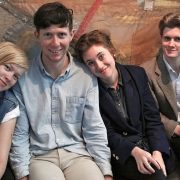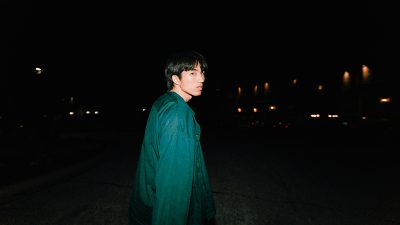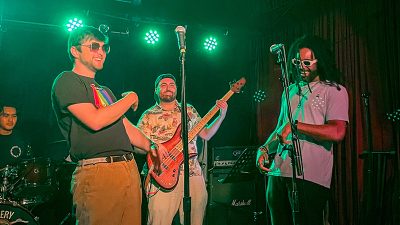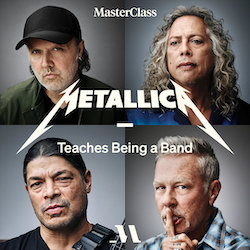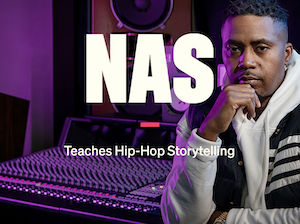NXNE interview: Paper Lions
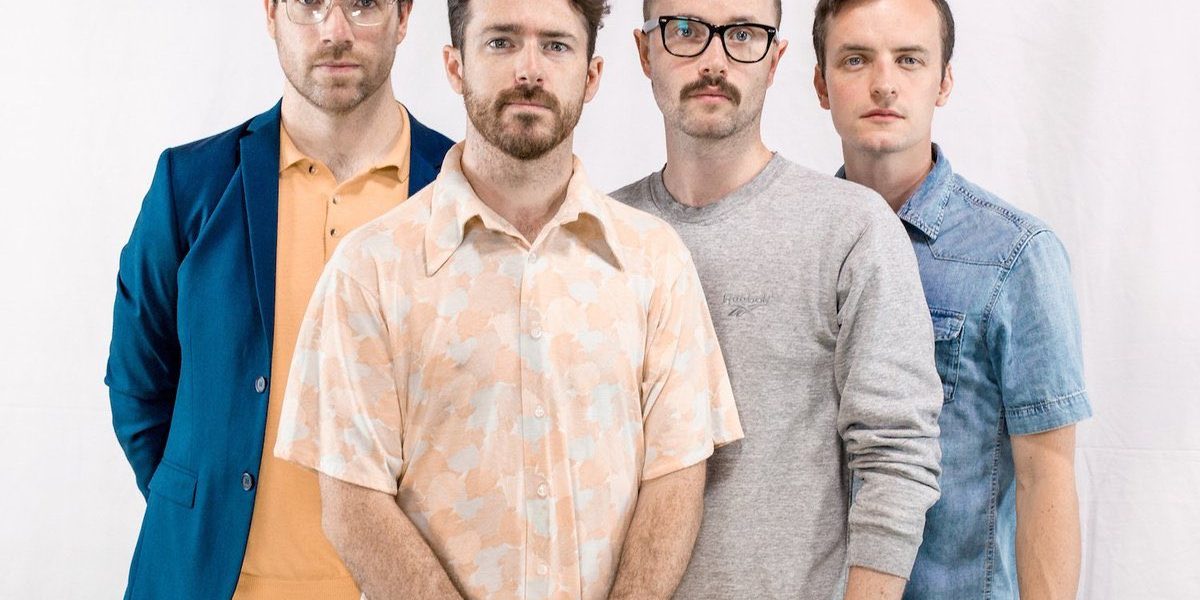
text: Michael Raine
Typical Maritimers, P.E.I.’s Paper Lions are so eager to please when you meet them. Asking how you’re doing, pulling up a chair, and making sure to find a spot to talk where everything can be heard alright. You can hardly find more accommodating people to have a chat with. Luckily they have a lot to say, or at least frontman John McPhee does as the others pipe up every once in a while to add their two cents.
The band – McPhee, his bass playing brother Rob, guitarist Colin Buchanan, and drummer David Cyrus MacDOnald – took some time out from their busy NXNE schedule to have a chat about their new acoustic EP, At Long Creek, as well their east coast influences, their home province, why they changed their name, and the lost album royalties that turned into a brilliant PR move.
Michael Raine: With the new acoustic EP and acoustic show here at NXNE, what inspired the new folk sound?
John McPhee: Truthfully, we started an Indiegogo campaign to help fund our last record and one of the packages included an acoustic EP. It was supposed to be just a quick, stripped-down sort of live-off-the-floor sort of job. But once we actually got into taking the tunes apart and analyzing them in a more stripped down fashion, we got really excited about the idea. So it kind of took on a life of its own and we found a great space out in the country in P.E.I., where we live, in an abandoned church out in the middle of nowhere with great acoustics and natural reverbs. We set up shop for a couple of days and out came the EP.
MR: How did you first come together as a band?
JM: The story of the band, the beginnings, is that Rob and I are brothers and Colin’s our next-door neighbour and we went to high school with Dave. So we’ve known each other, we’ve really grown up with each other and so when it came time to start the band – because I’d written a handful of songs when I was away on a trip – it seemed really natural to bring them to these guys. We’d all kind of played in crappy pop-punk high school bands anyway, so it seemed really natural to take these guys and, well not play pop-punk, but to start a band together.
Now, that was seven and a half years ago and the dynamic and, really, a lot of stuff about the band has changed and evolved, which is pretty natural when you’ve been together for seven years. But that was sort of the beginning and we’ve been going strong ever since.
MR: You started the band under another name, Chucky Danger Band, and found some success – award nomination and such – under that name. Why did you decide to change the name and did you worry about losing some of the momentum or notoriety that you’d gained?
JM: I think part of that was, I mean, we were really quite young. We were really just out of high school when we started, and Colin was still in high school, 16 or 17-years-old, so we settled on the name Chucky Danger without really thinking this was something to pursue as a career, as a lifelong pursuit. We thought, really, it would be just a few months over the first summer and then that’d be it. Three years later we saw a certain amount of success, certainly on the east coast of Canada, with Chucky Danger. But three years in we were a little older, a little wiser and we realized the name, Chucky Danger, didn’t properly represent who we were at the time or who we wanted to be moving forward.
As well, there were some shifting dynamics within in the band as far as how we view music or how we make music and performances; basically everything that encompasses being in a band. So, with that shift, as well as the fact we were just getting older, it seemed like the right time to change the name in order to put a stamp on those changes that had been happening.
MR: In that case, why’d you settle on Paper Lions?
JM: We went through a lot of different names and it was hard to find a band name that a) everybody liked, and b) that hasn’t been taken yet.
Colin Buchanan: We only got one of them [laughs]
JM: Yeah, it was essentially just narrowing down a list of about 400 names. Well, initially we had settled on the name “Lions Club”, which we all liked and thought was cool. After a little bit of research; my sister’s a lawyer and I ran it by her, like, “what could be the legal implications of choosing a name like Lions Club? Apparently, she said, not only could we be sued by Lions Club International, but we could be sued by every individual, rural branch of the Lions Club across the entire world. So, in the meantime, we’d had some work done up, which had lions and stuff in it, so we decided to stick with the lion theme went with Paper Lions.
MR: Your latest full-length album, Trophies, was initially released in 2010 and then you re-released it this year for free online. What’s the story behind that?
JM: Basically, how it played out is that we recorded Trophies independently and funded it ourselves in 2009. We took some time to find the right partner to release it, a distributor. There was a company out of Toronto, MB3, who came onboard to help us release it and for the first few months everything went well, a successful release in our eyes. But within a few months after the release in 2010 some things at their office just started to fall apart. It was somewhere between six to nine months after the release of our record; basically their office just shut down, we lost communication with them. Fast forward a year and half after the release of the record and we still hadn’t received any money from the sale of Trophies. Now, we didn’t think it was a ton of money or anything, we certainly assumed it wasn’t enough to bother hiring a lawyer and going after an office that wasn’t really open anymore, so we didn’t even know who to track down.
So we decided rather than try and go that means of trying to get the maybe-few thousand dollars that may be waiting for us, why don’t we just get rid of the road block of 10 dollars that people have to pay to get the record and lets just put it out for free online. We didn’t really think much of it. We wrote a letter to our fans just explaining, “look, if you bought the record a couple of months ago, we didn’t receive that money. This is why we’ve decided to put it out for free. If you find it kind of annoying that you shelled out ten bucks a few months ago, this is why we’re doing it.”
That letter, we put it up on our website – again, not really thinking anything of it – and the next day someone in the ReddIt community posted it on Reddit.com and it took off; the story about giving it away for free. Within 24 hours of putting that letter online we had something like 9,000 downloads of Trophies, our website crashed. It had over 100,000 hits just to check out that letter that we posted. So the amount attention that got was absolutely overwhelming, we had no idea people we going to react that way but obviously we’re happy with how the music had gotten out to so many people.
MR: So in the end it ended up being a pretty good career move
JM: Yeah, it wasn’t our intention. We actually just felt that the record had been out long enough and we just wanted to get it out to as many people as possible. We didn’t expect it to turn into some sort of media frenzy by any means but it was welcome when it came.
MR: Did you ever find out what happened to your money?
JM: It’s kind of a pending, on-going conversation but I don’t think there’s any hostility on either end. It’s something that will work out over time, I’m sure.
MR: You two, John and Rob, are brother, obviously. What is the band dynamic like and how does that brotherly relationship affect it?
Dave Cyrus MacDonald: When I first joined the band they used to argue a lot. The first few months of being in the band; I remember, like, they had started assembling the songs before I joined a month or two later and I had played with them a little in high school not really that much. I was like, “I don’t know if I can be with these guys. They’re always butting heads constantly.” I don’t know what happened but that seemed to stop just a few months later.
CB: I think everybody’s grown up a bit over the years and Rob and Jon have put aside their differences and get along great.
Rob McPhee: We were just fighting like brothers, the way that we’ve always fought like brothers. We’re right next to each other in the family and we’re only a few years apart and we’ve always fought, as brothers do, especially in a larger family. There’s five of us in total, all the siblings, so a few months into the band we realized it wasn’t working out very well for the benefit of the band and we just kind of stopped and it wasn’t that hard.
DCM: So that was the first few months of the band and now it’s seven and half years later and it’s smooth sailing.
M: Do you all have similar musical influences? What’s your musical chemistry like?
JM: Yeah, it’s not so much influence as far as other bands. Just a length of time playing music together and having helped teach each other learn how to play guitar and learn drums and bass. We grew up rural P.E.I. where there really isn’t anything to do at all. There’s a hockey rink and a pool, but that’s pretty much the extent of what you can do around Belfast in the summer and winter time. So I think there’s definitely chemistry there because we’ve played with no one different over the years. We’ve kept playing together and there’s a lot of unspoken, sort of, musical influence that happens and always has since we started playing together.
MR: Is there a benefit to staying based in P.E.I rather than moving to a city like Halifax or Montreal or Toronto?
JM: Yeah, I’d say we will remain in P.E.I. We will always consider it home, whether we always live there or not, time will tell. There were certainly other places in the world that we enjoy being in but as far as the benefits of P.E.I. goes, there are many. This time of year, to live on P.E.I. in the summertime is, in my opinion, – probably in all of our opinion – one of or the best place to live in Canada in the summertime. The beaches and the weather and barbeques and friends and family and all these great things that come with the island.
But then musically, too, there’s a community that we have grown up with over the past seven years. Some really great music being created. Really, it’s like all these bands and artists are sharpening one another. I can’t speak from experience in other towns, because we haven’t lived anywhere else, whether that is happening in other cities or not and how competitive that is. I would say that the cool thing is that it’s not really that competitive, it’s not really an aggressive thing. It’s more, you’re kind of watching your periphery for what other bands are doing and it does spur you on to dig a little deeper with every song that you write and every album that you create. So being part of that community is definitely one of the massive bonuses of living on the island.
MR: The east coast has a real tradition of folk music. Has that influenced you lately with the new EP and acoustic shows?
JM: I would say so. We all grew up playing acoustic instruments and not electric, for sure. I think that style of music – that sort of stripped down style – does seem to be kind of popular in the main stream right now with groups like Mumford and Sons and Old Crow Medicine Show, and these people that seem like throw-back acts to a lot of people in the mainstream. But that’s just a sound that’s always existed on the east coast. And the east coast, and P.E.I. in general, doesn’t really play into trends very much. I think it’s been true to its folk and bluegrass traditions and these are things that have always existed on the east coast. It’s more so that the rest of pop music is starting to catch on now that this is a refreshing way to listen to music and a refreshing way to play music.
MR: You’d mentioned the Indie-Go-Go campaign. Are you to use that fan-funding formula for the next album?
JM: Whether or not we use Indiegogo again, or one of those crowd funding platforms, is yet to be seen. What we do have, it’s kind of complicated, but in March we recorded a full-length record and Indiegogo was used to fund part of the creation of the record. That is album is not out, we just have it sitting in our pocket right now. While that was getting mixed and mastered, we record At Long Creek, this acoustic EP and that is coming out Saturday. The full-length record is probably coming out in the fall or maybe early-winter, 2013. So, as far as the next LP, that’s a long way out in my mind because we have this EP coming out tomorrow and then the full-length record waiting to be released.
MR: How did the campaign go? How much was actually paid for by fans?
JM: We did a campaign that lasted 45 days and basically how it works, it’s a pre-order campaign. So for as little as five dollars people could pre-order an advanced copy of the digital LP, for I think 35 dollars they could get the digital LP plus the vinyl, and then all the way up to $55,000, which of course we didn’t sell, was the instant band perk, I think it was, which was a band van full of gear and executive producer [title] on our record. We didn’t sell that one. There’s no one who has $55,000 who’s a Paper Lions fans.
It worked out really great. It funded a third of our record, which was a massive help.
MR: Looking at the big picture, what kind of career do you want to have?
JM: I think right now we’re really interested in something like the acoustic EP and it was really fun for us to conceptualize something really quick, get in the studio within a couple of days, mix and master it within a week, and now we’re putting it a week or two later. That’s a totally different process than what we’ve done in the past where, you know, you labour over songs for a long time, you book your studio time months ahead, you go someplace or set up shop on the island somewhere we’re at. We’re really jazzed by the idea of just spontaneously creating content and putting it out quickly to our fans.
Don’t get me wrong, I think it’s really great to have a full-length record that, in our opinion, sounds spectacular and huge and way bigger than we could ever imagine. But, we’re really excited to keep pushing out a lot of different content and be coming at our songs from a lot of different angles and putting it out to our fans as quickly as possible.
MR: How do you make band decisions? Are you a democracy or benevolent dictatorship?
CB: We’re a pretty good democracy. We have a pretty good system of warranted delegation of tasks but I guess Jon would be the admirable admiral at the end of the day.
JM: Yeah, I guess it’s definitely democratic. Any decision that bares any sort of consequence towards the band, three people need to be voting for it.
DCM: And we can’t vote on it before it properly discussed.
RM: Oh, we discuss things until you just want to tear your hair out. We’ll discuss it forever. We’re beyond democracy in this band, it’s crazy. I mean, it all works out in the end but we talk about stuff a lot.
MR: Lastly, how do you write the songs (i.e. does one person write on the lyrics etc.)?
CB: I think we’re fairly democratic. We’re not really into counting who did what lyrics or chord progression or drum part or whatever. We’re just about making the songs as good as possible. We find the way is to collaborate and just see where the songs go.


